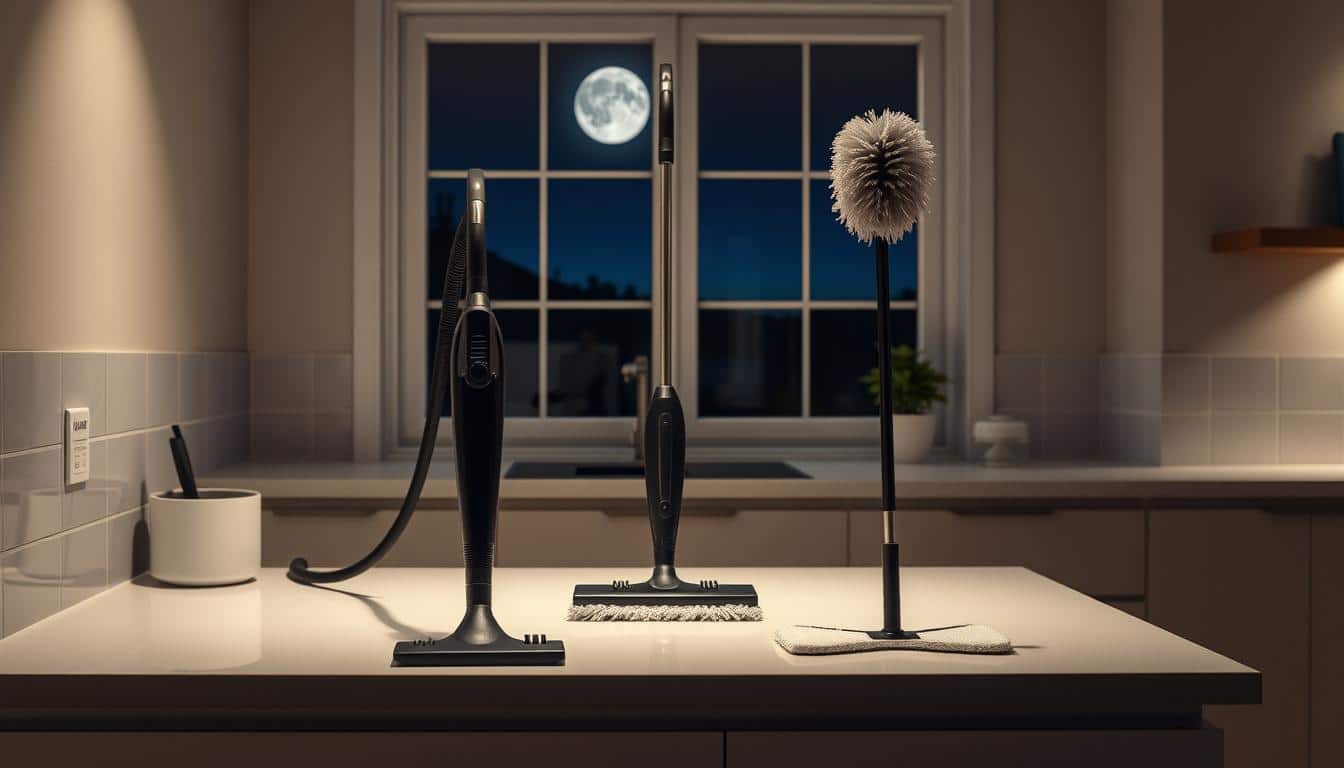Keeping a clean home in today’s busy world can seem tough. It’s even harder when you want a nice quiet sleep. This article shows you how to tidy up at night without wrecking your sleep. We’ll talk about quiet cleaning strategies and night cleaning routines. This can help keep your place neat and your sleep sound. We’ll also cover how being clean affects your mind and how to make your home a calm sleep zone.
Importance of a Clean Sleeping Environment
A clean sleep environment is key for good sleep. Too much clutter can make us stressed and anxious. This makes it hard to sleep well. A clean room helps our minds relax, which lets us sleep better.
Impact of Clutter on Sleep Quality
Clutter doesn’t just fill up our rooms. It also keeps our brains busy and alert. This makes it hard for us to calm down at night. If we clear out the clutter, our minds can relax. This helps us sleep more deeply.
How Cleanliness Affects Mental Health
Being clean does more than just tidy up a room. It’s good for our mental health, too. Clean spaces can make us feel less stressed and happier. When we’re in a clean room, it’s easier to relax and sleep well. Keeping our sleeping area clean is good for our minds and our sleep.
Preparing for Nighttime Cleaning
Making a nighttime cleaning plan is key to keeping your home neat with little disturbance. A good plan helps make sure cleaning fits into your night without messing with sleep. Organizing cleaning tasks well makes the process smooth, maintaining a calm home.
Creating a Cleaning Schedule
Having a set cleaning schedule helps manage time and tasks better. Here are some tips for making your nighttime cleaning plan:
- Assess your space and determine which areas require attention.
- Allocate specific days for particular tasks, allowing for consistency.
- Set a time limit for each cleaning session to keep it efficient.
Gathering Quiet Cleaning Supplies
Choosing quiet cleaning tools helps cut down noise at night. Here are some tools to think about:
- Soft brooms and mops for quieter sweeping.
- Microfiber cloths for dusting and wiping surfaces with less noise.
- Non-vacuum floor cleaners to clean without loud vacuum noises.
Quiet Night Cleaning Tips for Undisturbed Sleep
Cleaning your home at night without ruining the peace is all about the right strategies. Using quiet cleaning tools and natural products helps a lot. This makes your cleaning experience better and keeps the environment peaceful.
Using Silent Tools and Equipment
Using quiet cleaning tools, like low-noise vacuums, means you can clean without loud sounds. Products such as soft dusters and microfiber cloths also keep the noise down. These choices help make night cleaning smooth and less disturbing.
Natural Cleaning Products for Minimal Noise
Going for natural cleaning products is good for both the planet and keeping things quiet. These products don’t have harsh chemicals or strong smells. So, they make cleaning at night easier on everyone and less likely to bother them.
Strategies to Minimize Disruptions
To keep the peace, try closing doors while you clean and work around everyone’s schedules. Cleaning at specific times, especially when others are asleep, helps too. These steps will help everyone sleep well, despite the cleaning.
Decluttering Before Cleaning
A clean space is key for night cleaning. Without clutter, cleaning is easier and can help you sleep better. It removes distractions, making your room a peaceful place.
Importance of a Tidy Space
Organized areas help you focus better when cleaning. Being neat not only makes cleaning easier but also helps keep your home in order. Keeping things tidy is crucial for any home organization plan.
Effective Decluttering Techniques
Good decluttering tips can change how you clean. Here are some ideas:
- Sort items into three piles: keep, donate, or toss. This helps you decide what you really need.
- Use a timer for 15 minutes to clean small spots quickly. This makes it feel less like a big job.
- Use bins and baskets to stay organized. Good storage keeps everything neat.
With these tips, getting ready to clean at night is easier and quicker.
Deep Cleaning without Disturbing Others
When cleaning at night, it’s important to focus on bedrooms and living areas. These places affect how well you sleep. By choosing the right methods, you can clean deeply without making much noise.
Target Key Areas Like Bedrooms and Living Spaces
Cleaning important areas like where you rest can improve your night. Make sure that:
- Bedrooms are free of dust and allergens.
- Living spaces are neat and organized for a calming atmosphere.
This way, you can clean well without bothering anyone.
Focus on Dusting and Vacuuming Tips
Good dusting tactics are key for quiet night cleaning. Remember to:
- Use soft cloths for dusting quietly.
- Choose canister vacuums. They’re quieter than upright ones at night.
These tips keep your home peaceful and improve the air you breathe, helping you sleep better.
Optimizing Air Quality While Cleaning
Keeping the air clean is vital for health, especially when cleaning. Adding indoor plants to your space helps improve air quality. These plants can clear the air of pollutants. They make your home more peaceful and healthy.
Benefits of Indoor Plants
Plants like the snake plant and peace lily are great for cleaning the air. They remove toxins like formaldehyde. This not only cleans the air but also helps you relax and sleep better.
The Role of Air Purifiers
Air purifiers, with HEPA filters, are important for cleaner indoor air. They trap allergens such as pollen and dust. This can reduce allergies and breathing problems. Having an air purifier helps keep your space fresh and improves your sleep.
Refreshing Your Linens Quietly
Keeping your bedding clean is key to a good night’s sleep. It makes your sleep more comfortable and keeps away allergens and bad smells. It’s important to pick the right time to wash your linens. This way, you won’t disturb anyone’s sleep.
Choosing the Right Time for Laundry
Doing laundry early in the evening works best. Most times, people are doing quiet activities then. This helps you not to interrupt anyone’s sleep or relaxation. It’s good to know other people’s schedules. This way, you can do your laundry without making too much noise.
Tips for Reducing Noise During Laundry
Lowering noise when washing your clothes makes a big difference.
Here are some ways to keep things quiet:
- Select gentle cycles on washing machines to minimize vibrations and noises.
- Utilize padded hangers to prevent clanging sounds when hanging clothes.
- Close laundry room doors while operating machines to muffle sound further.
- Time dryer use wisely, perhaps during less busy hours, to maintain peace.
Creating the Perfect Sleep Sanctuary
Creating a sleep sanctuary means making your bedroom perfect for sleep. Things like the right temperature and light are very important. By setting up your room just right, you can turn it into a peaceful place for sleep.
Adjusting Temperature and Lighting
Keeping your bedroom cool, between 65°F and 68°F, helps you sleep better. This coolness helps your body get ready for deep sleep. Try setting your AC right, choosing sheets that keep you cool, and keeping the room from getting too hot during the day.
How your room is lit also affects your sleep. Low light or darkness helps your body get ready to sleep by making melatonin. You can use blackout curtains to keep out unwanted light, making your room more cozy. Avoiding bright or blue light in the evening also helps prepare you for sleep.
Minimizing Noise for Sound Sleep
Making a peaceful place to sleep means finding ways to lessen noise. You can sleep better by using methods to cut down sound. This helps you block out annoying noises from outside. Soundproofing your space not only makes it more comfy. It also helps you relax more when you’re sleeping.
Implementing Sound-Reducing Techniques
Here are some ways to keep your sleeping area quiet:
- Use thick rugs or carpets to soak up sound and lessen echoes.
- Put up heavy curtains or shades that keep out noise from outside.
- Close gaps in windows and doors to keep noise out.
- Try adding soundproofing materials to walls for even more quiet.
White Noise Machines and Their Benefits
White noise machines can make sleeping better with their calming sounds. They help by:
- Covering up annoying sounds from your surroundings.
- Offering a steady sound that helps you unwind.
- Making sleep nicer, especially in loud places.

Post-Cleaning Relaxation Techniques
After a night of cleaning, it’s important to calm down. Relaxation techniques can help with this, making it easier to sleep. Practicing mindfulness before bed calms your mind and gets your body ready for rest. Adding simple activities to your nighttime routine can really help you sleep better.
Mindfulness Practices Before Bed
Mindfulness brings your focus to the present moment. It involves:
- Listening to calming music or nature sounds
- Engaging in guided meditation for breathing
- Feeling grateful by thinking about the good things of the day
Doing these things makes a quiet space that helps you relax.
Deep Breathing Exercises for Better Sleep
Deep breathing exercises can help you relax and get ready for sleep. Focusing on your breathing calms your nerves. Here are some easy steps:
- Breathe in deeply through your nose, let your belly rise.
- Hold it for a few seconds.
- Breathe out slowly through your mouth, releasing tension.
Doing breathing exercises regularly can improve your sleep. Use these methods to create a peaceful sleep environment.
Conclusion
Making your cleaning routine quiet at night can make your sleep better. Keeping your place clean is super important. It affects your health and happiness. The tips we talked about help you clean up without making too much noise.
When you choose quiet cleaning methods and natural cleaners, you can clean up at night without bothering anyone. This way, your home stays calm, and you won’t mess up your sleep. Doing some relaxing stuff after cleaning makes going to bed even nicer.
In short, these quiet cleaning tips do more than just keep your house tidy. They also make your sleep better. Use these ideas to make your home a calm place for awesome sleep.



